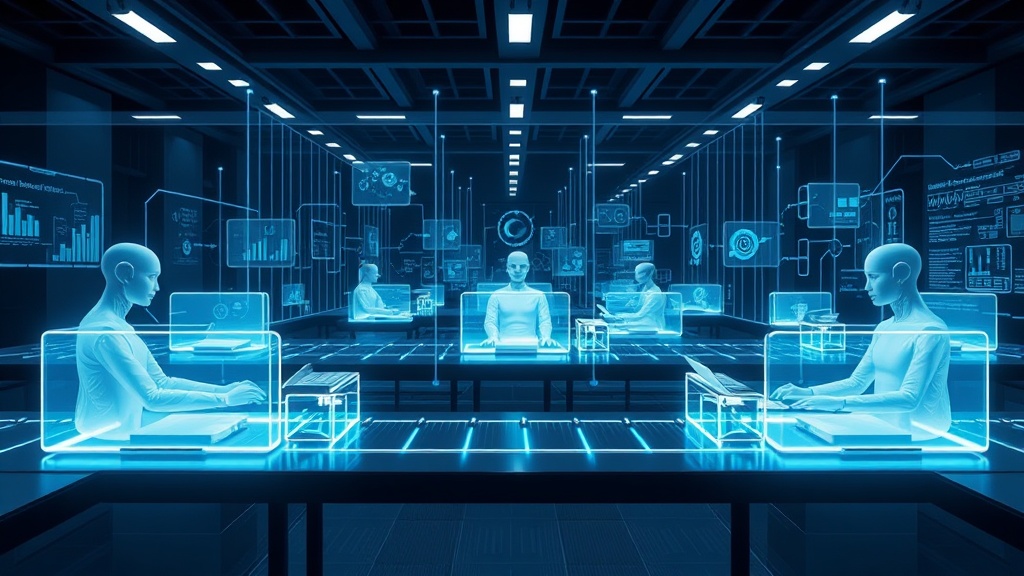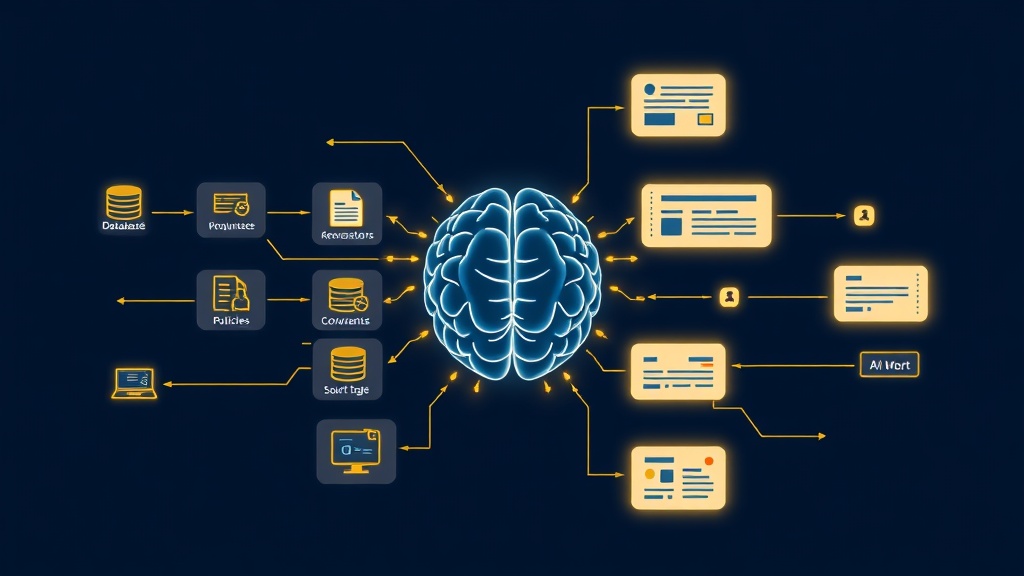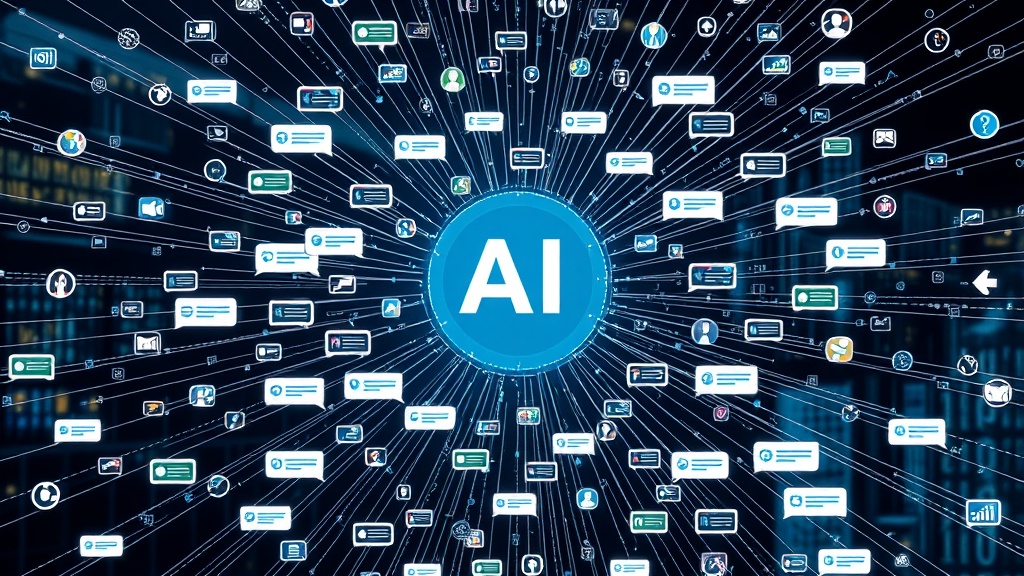
Autonomous AI Agents: The Revolution Enabling Limitless Business Scale
Autonomous AI agents are transforming business operations in 2025, with systems like OpenAI's Operator achieving 40% time savings and companies like Rossellimac revolutionizing customer service. Discover how 48% of organizations plan to expand their use of these intelligent systems that enable unlimited scaling without proportional staff increases.
The business world is witnessing a fundamental shift in how operations scale. Autonomous AI agents—intelligent systems capable of planning, executing tasks, and making decisions without constant human supervision—are transforming the very concept of organizational growth. These aren't simple automation tools; they're sophisticated digital workers that think, adapt, and collaborate, enabling businesses to expand without the traditional constraints of human resources.
Beyond Chatbots: The Rise of the Digital Workforce
Autonomous AI agents represent a quantum leap beyond traditional chatbots and basic automation. While chatbots respond to queries, autonomous agents actively plan, execute complex multi-step processes, and make contextual decisions. They integrate advanced language models, computer vision, reasoning capabilities, and planning algorithms to operate independently within real business environments.
These agents function as a true "digital workforce," seamlessly navigating enterprise software, web interfaces, and data systems. They don't just follow scripts—they understand objectives, devise strategies, and adapt their approach based on real-time feedback and changing conditions.
The distinction is crucial: while a chatbot might answer customer questions, an autonomous agent can investigate issues, access multiple systems, compile reports, implement solutions, and even coordinate with other agents to resolve complex problems—all without human intervention.
The Operator Era: OpenAI's Game-Changing Launch
OpenAI's Operator, launched in 2025, exemplifies the transformative potential of autonomous agents. This system can execute complex online tasks ranging from purchasing decisions to comprehensive report generation, achieving time savings of up to 40% in operational processes.
Operator doesn't just automate simple tasks—it handles nuanced, multi-step processes that previously required human judgment. It can research products, compare options, make purchasing decisions based on specified criteria, and even handle unexpected situations like website errors or process changes. This level of autonomy represents a fundamental shift in what businesses can delegate to AI systems.
The impact extends beyond time savings. By handling routine but complex tasks, Operator and similar systems free human workers to focus on creative, strategic, and relationship-building activities that truly require human insight and empathy.
Rapid Adoption: The Numbers Tell the Story
The adoption curve for autonomous agents is steep and accelerating. According to Capgemini's research, 30% of medium-sized European companies will begin integrating autonomous agents before 2027. Even more striking, 48% of organizations plan to increase their autonomous agent projects in 2025 alone.
This rapid adoption isn't driven by hype—it's a response to demonstrated value. Companies implementing these systems report immediate improvements in efficiency, accuracy, and scalability. The technology has moved from experimental to essential in record time.
Accenture's analysis confirms this trajectory, with 40% of global executives anticipating significant increases in autonomous agent usage over the next three years. This widespread executive buy-in signals that autonomous agents have crossed the chasm from early adoption to mainstream business strategy.
Real-World Success: Rossellimac's Transformation
Rossellimac's implementation of Salesforce Agentforce provides a compelling case study in autonomous agent deployment. The company achieved dramatic reductions in incident resolution times while simultaneously improving customer experience and retention rates.
Their autonomous agent doesn't just handle routine inquiries—it actively manages complex customer issues, accessing multiple systems, analyzing patterns, and implementing solutions. The system learns from each interaction, continuously improving its effectiveness and expanding its capability to handle increasingly complex scenarios.
The results speak volumes: faster resolution, happier customers, and reduced operational costs. But perhaps most importantly, Rossellimac achieved these improvements without adding staff, demonstrating the scalability promise of autonomous agents.
The Manus Revolution: Autonomous Development
Startups and technology companies are pushing boundaries even further with agents like Manus, capable of self-executing programming and design tasks without supervision. These agents don't just write code—they understand requirements, design architectures, implement solutions, test results, and iterate improvements.
The impact on development cycles has been transformative. Projects that once required weeks of developer time now complete in days. Quality improvements are equally impressive, as these agents apply consistent best practices and catch errors that human developers might miss.
This autonomous development capability represents a paradigm shift in software creation. Companies can now tackle projects previously deemed too resource-intensive, opening new possibilities for innovation and market expansion.
Real-Time Intelligence: Decision Making at Scale
Autonomous agents excel at real-time decision-making based on live data analysis and continuous learning. Unlike traditional automation that follows predetermined rules, these agents adapt to changing contexts and evolving situations.
This adaptive capability proves invaluable in dynamic business environments. Market conditions change, customer preferences evolve, and competitive landscapes shift—autonomous agents adjust their strategies accordingly, ensuring businesses remain agile and responsive.
The agents' ability to process vast amounts of data instantaneously enables decision-making at scales impossible for human teams. They can monitor thousands of variables, identify patterns, predict outcomes, and implement optimal strategies across entire organizations simultaneously.
Seamless Integration: The Enterprise Ecosystem
Modern autonomous agents don't operate in isolation—they integrate fluidly with existing enterprise systems. CRM platforms, ERP systems, databases, and communication tools all become part of the agent's operational environment.
This integration happens without disrupting existing workflows. Agents access systems through APIs, web interfaces, or direct database connections, working alongside human users without requiring system overhauls or process redesigns.
The ability to operate within existing infrastructure dramatically reduces implementation barriers. Companies don't need to rebuild their technology stacks; they simply add autonomous agents as new team members who happen to work 24/7 without breaks.
Security and Compliance: Built-In Governance
Contrary to concerns about AI running amok, modern autonomous agents incorporate sophisticated security and compliance controls. These systems operate within defined parameters, maintain audit trails, and ensure regulatory compliance across all actions.
Risk optimization becomes more effective with autonomous agents monitoring and managing potential issues in real-time. They can detect anomalies, flag compliance concerns, and implement corrective actions faster than human oversight teams.
This enhanced security doesn't come at the cost of flexibility. Agents operate within governance frameworks while maintaining the autonomy to make decisions and take actions that drive business value.
The Microservices Economy: Collaborative Intelligence
Autonomous agents are fostering a new economy based on specialized microservices. Instead of monolithic systems, businesses deploy networks of specialized agents, each expert in specific domains, collaborating to achieve complex objectives.
One agent might specialize in customer sentiment analysis, another in inventory optimization, and a third in financial forecasting. These agents communicate, share insights, and coordinate actions, creating an intelligent ecosystem that's greater than the sum of its parts.
This collaborative model enables unprecedented flexibility and scalability. Businesses can add new capabilities by deploying additional specialized agents, creating custom configurations that precisely match their unique needs.
Scaling Without Limits: The New Business Reality
The promise of unlimited scaling without proportional staff increases is becoming reality. Autonomous agents handle workload increases seamlessly, whether managing ten transactions or ten thousand. Peak periods, seasonal fluctuations, and sudden growth spurts no longer strain organizational resources.
This scalability extends beyond volume to complexity. As agents learn and improve, they handle increasingly sophisticated tasks, enabling businesses to take on challenges previously beyond their capabilities.
The economic implications are profound. Companies can pursue opportunities previously deemed unprofitable due to resource constraints. Markets become accessible, services become viable, and innovation accelerates.
The Human Element: Augmentation, Not Replacement
Successful autonomous agent deployment augments rather than replaces human workers. These systems handle routine, repetitive, and data-intensive tasks, freeing humans for creative, strategic, and interpersonal work.
The result is a more satisfied, more productive workforce. Employees escape the drudgery of repetitive tasks and engage in meaningful work that leverages uniquely human capabilities like creativity, empathy, and complex problem-solving.
This human-agent collaboration creates competitive advantages impossible with either approach alone. Businesses get the efficiency and scale of automation combined with the insight and innovation of human intelligence.
Your Gateway to Autonomous Scale
Intelligent automation isn't just for tech giants. At txat by gako.ai, deploy sophisticated conversational agents in minutes with advanced RAG technology that adapts to your business needs.
Ready for limitless scale? Start your free trial at txat and transform your operations with intelligent automation.


